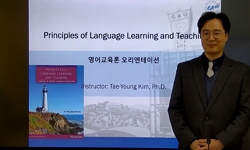The present study aimed to investigate the effects of output and the opportunity for modified output on second language (L2) learning. Forty-five intermediate-level Korean EFL learners participated in the study. Participants were randomly assigned to ...
http://chineseinput.net/에서 pinyin(병음)방식으로 중국어를 변환할 수 있습니다.
변환된 중국어를 복사하여 사용하시면 됩니다.
- 中文 을 입력하시려면 zhongwen을 입력하시고 space를누르시면됩니다.
- 北京 을 입력하시려면 beijing을 입력하시고 space를 누르시면 됩니다.

Investigating the Effects of Output and Opportunity for Modified Output on Second Language Learning
한글로보기부가정보
다국어 초록 (Multilingual Abstract)
The present study aimed to investigate the effects of output and the opportunity for modified output on second language (L2) learning. Forty-five intermediate-level Korean EFL learners participated in the study. Participants were randomly assigned to a control group (i.e., non-output group) or one of two experimental groups, which differed in whether they were given an immediate opportunity to modify their output after receiving relevant input (i.e., a model text) within an output-input sequence. The study employed a pretest-posttest design, with a written story-retelling task as the treatment. A retrospective debriefing questionnaire was used to probe learners’ noticing. L2 development was measured through a recognition test, a paraphrase test, and a text completion task. Results indicated that learners who had output opportunities during the treatment significantly outperformed those who did not, as measured by the production posttests, although no significant difference was found on the recognition posttest. Additionally, the immediate opportunity to modify output following output-input activities did not significantly affect learners’ subsequent recognition or production of the targeted form. The findings are discussed in relation to the research design and existing literature, with pedagogical implications provided.
다국어 초록 (Multilingual Abstract)
The present study aimed to investigate the effects of output and the opportunity for modified output on second language (L2) learning. Forty-five intermediate-level Korean EFL learners participated in the study. Participants were randomly assigned to ...
The present study aimed to investigate the effects of output and the opportunity for modified output on second language (L2) learning. Forty-five intermediate-level Korean EFL learners participated in the study. Participants were randomly assigned to a control group (i.e., non-output group) or one of two experimental groups, which differed in whether they were given an immediate opportunity to modify their output after receiving relevant input (i.e., a model text) within an output-input sequence. The study employed a pretest-posttest design, with a written story-retelling task as the treatment. Retrospective debriefing questionnaire was used to probe learners’ noticing. L2 development was measured through a recognition test, a paraphrase test, and a text completion task. Results indicated that learners who had output opportunities during the treatment significantly outperformed those who did not, as measured by the production posttests, although no significant difference was found on the recognition posttest. Additionally, the immediate opportunity to modify output following output-input activities did not significantly affect learners’ subsequent recognition or production of the targeted form. The findings are discussed in relation to the research design and existing literature, with pedagogical implications provided.
동일학술지(권/호) 다른 논문
-
- 한국외국어대학교 외국어교육연구소
- 안지은
- 2024
- KCI등재
-
Investigating Phrasal Features in CLIL and Non-CLIL Writing through an NLP Tool
- 한국외국어대학교 외국어교육연구소
- 이종봉
- 2024
- KCI등재
-
- 한국외국어대학교 외국어교육연구소
- 장연이
- 2024
- KCI등재
-
L1-한국어 초등학교 4학년 학습자의 L2-영어 읽기 요인과 단어 인지의 직·간접 효과: 구조방정식모형 분석
- 한국외국어대학교 외국어교육연구소
- 백승현
- 2024
- KCI등재




 KCI
KCI KISS
KISS






